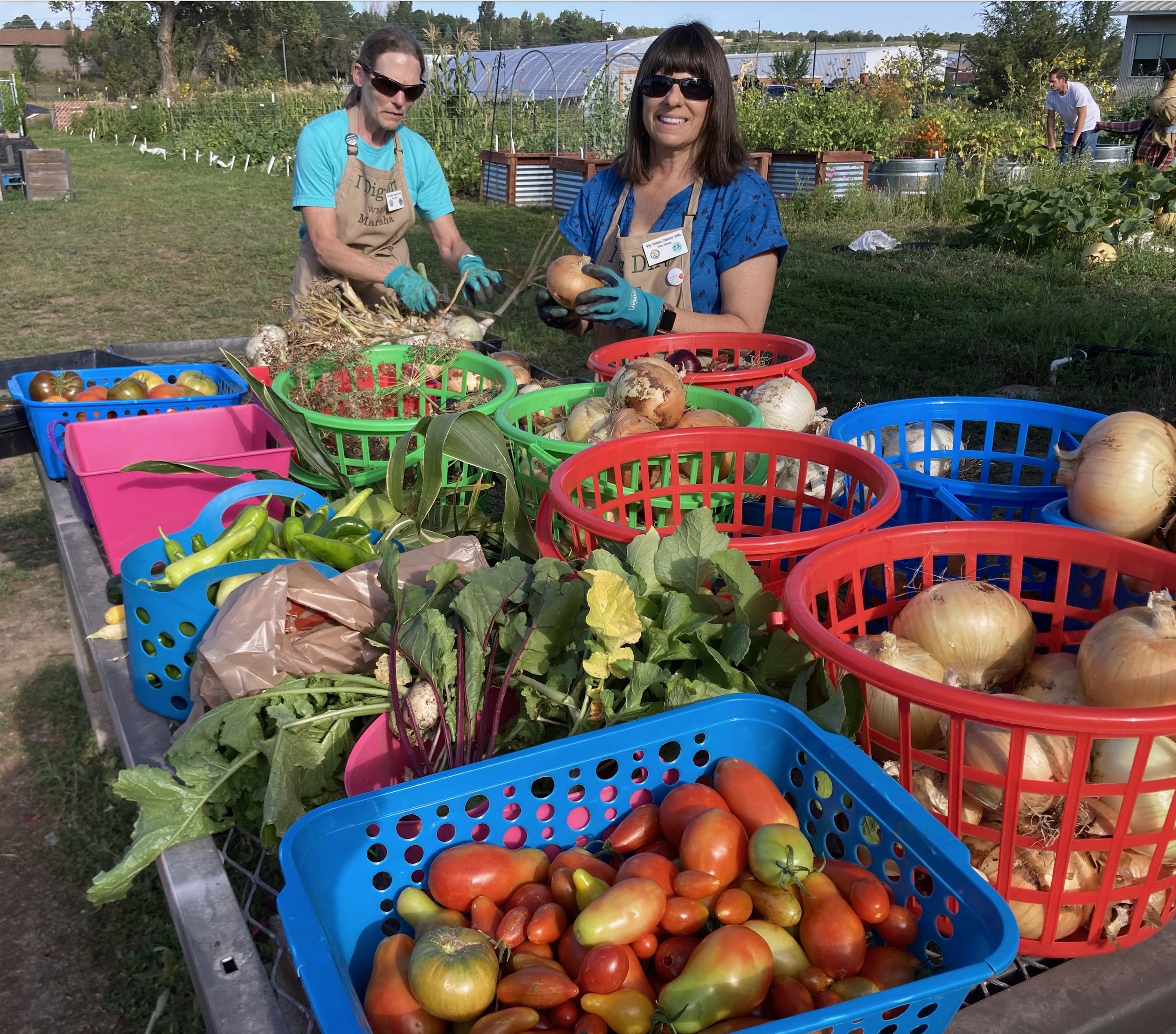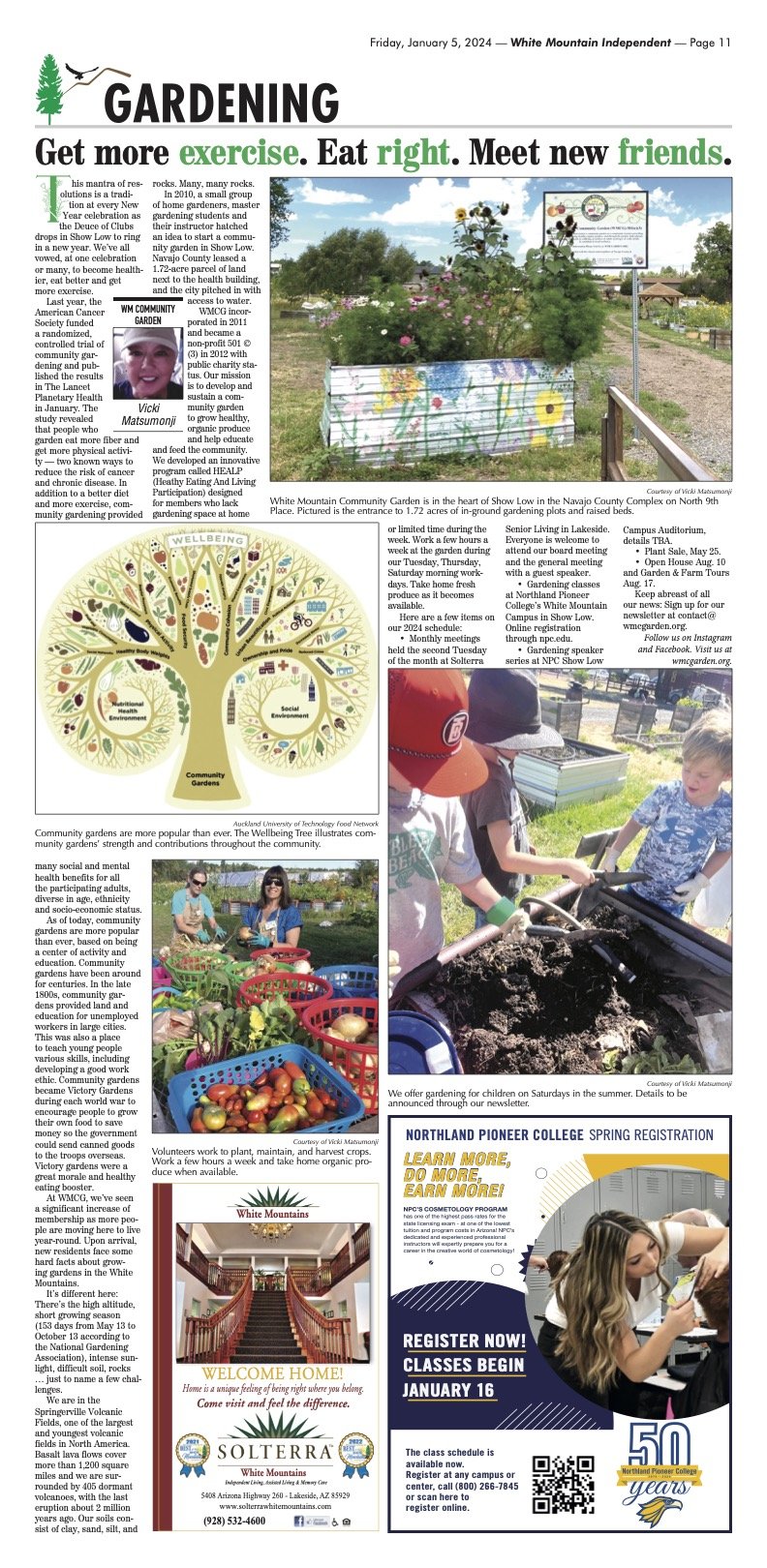Get more exercise. Eat right. Meet new friends
This mantra of resolutions is a tradition at every new year’s celebration as the Deuce of Clubs drops in Show Low to ring in a new year. We’ve all vowed at one celebration or many, to become healthier, eat better, and get more exercise.
Last year, the American Cancer Society funded a randomized, controlled trial of community gardening and published the results in The Lancet Planetary Health in January. The study revealed that people who garden eat more fiber and get more physical activity – two known ways to reduce the risk of cancer and chronic disease. In addition to a better diet and more exercise, community gardening provided many social and mental health benefits for all the participating adults diverse in age, ethnicity, and socio-economic status.
We are located in the heart of Show Low in the Navajo County Complex on North 9th Place. Here’s the entrance to 1.72 acres of in-ground plots and raised beds.
As of today, community gardens are more popular than ever based on being a center of activity and education. Community gardens have been around for centuries. In the late 1800’s, community gardens provided land and education for unemployed workers in large cities. This was also a place to teach young people various skills and include developing a good work ethic. Community gardens became Victory Gardens during each world war to encourage people to grow their own food to save money so the government could send canned goods to the troops overseas. Victory gardens were a great morale and healthy eating booster.
Community gardens are more popular than ever. The Wellbeing Tree illustrates community gardens’ strength and contributions throughout the community.
At WMCG, we’ve seen a significant increase of membership as more people are moving here to live year-round. Upon arrival, new residents face some hard facts about growing gardens in the White Mountains.
It’s different here: high altitude, short growing season (153 days from May 13 to October 13 according to the National Gardening Association), intense sunlight, difficult soil, rocks...just to name a few challenges.
We are in the Springerville Volcanic Fields, one of the largest and youngest volcanic fields in North America. Basalt lava flows cover more than 1,200 square miles and we are surrounded by 405 dormant volcanoes with the last eruption about 2 million years ago. Our soils consist of clay, sand, silt, and rocks...many, many rocks.
Gardening here has many challenges. We are in the Springerville Volcanic Fields (left) surrounded by 405 dormant volcanoes (right). Our soil is rocky and alkaline.
In 2010, a small group of home gardeners, master gardening students and their instructor hatched an idea to start a community garden in Show Low. Navajo County leased a parcel of land (1.72 acres) next to the health building and the city pitched in with access to water.
Volunteers work to plant, maintain, and harvest crops. Work a few hours a week and take home organic produce when available.
WMCG incorporated in 2011 and became a non-profit 501 (c) (3) in 2012 with public charity status. Our mission is to develop and sustain a community garden to grow healthy, organic produce and help educate and feed the community. We developed an innovative program called, HEALP (Heathy Eating And Living Program) designed for members who lack gardening space at home or limited time during the week. Work a few hours a week at the garden during our Tuesday, Thursday, Saturday morning workdays. Take home fresh produce as it becomes available.
We offer gardening for children on Saturdays in the summer. TBA through our newsletter.
Here are a few items on our 2024 schedule:
Monthly meetings held the 2nd Tuesday of the month at Solterra Senior Living in Lakeside. Everyone is welcome to attend our Board Meeting and the General Meeting with a guest speaker.
Gardening classes at Northland Pioneer College, White Mountain Campus in Show Low. Online registration through www.npc.edu.
Gardening speaker series at NPC Show Low Campus Auditorium--details TBA.
Plant Sale, May 25
Open House August 10 and Garden & Farm Tours, August 17.
Sign up for our newsletter at contact@wmcgarden.org
Follow us on Instagram and Facebook.
Visit: wmcgarden.org
Published in the White Mountain Independent, Friday, January 5, 2024
Digital version:
https://www.wmicentral.com/news/local_news/get-more-exercise-eat-right-meet-new-friends/article_0afab30b-d5fd-5bf7-85a8-2d6edab1cddb.html





